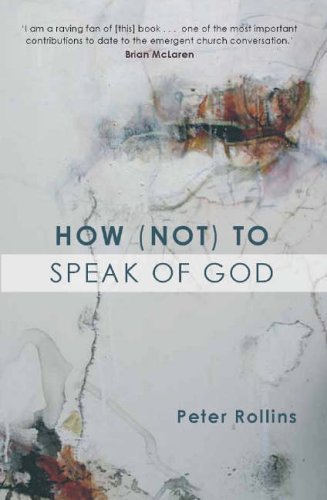Peter Rollins's Blog, page 41
July 14, 2012
Building on Fire, San Diego, CA
Building on Fire: The Theory and Practice of Pyrotheology
In contrast to the typical understanding of Christianity as offering satisfaction and certainty these seminars aim to unearth a more radical and disturbing alternative. By employing a method he calls “pyrotheology” Peter will offer an approach that explores how the event testified to in the founding documents of Christianity invites us to take a different path. One in which we learn how to embrace the idea that we can’t be whole, that life is traumatic and that we don’t know the secret.
Decrying the popular view of God as a product that will render us complete, remove our suffering and reveal the answers, Peter will offer the blueprint for a faith that courageously embraces brokenness, resolutely faces up to unknowing and joyfully accepts the difficulties of existence. It is only by taking this journey, he will argue, that we can appreciate what it might mean to rob death of its sting and taste life in all its fulness.
Through these sessions Peter will not only offer the theoretical underpinning of this approach but also outline ways in which we can embody it in practice.
This is an in-depth, intensive, limited seating event. Tickets cost $49.95. To reserve a place click here.
10am – 4pm
Sat. July 21st, 2012
Missiongathering Christian Church
3090 Polk Ave. San Diego, CA 92104
619.624.9335
info@missiongathering.com
July 12, 2012
The Future Might be Risky, But So Is the Past
Our futures stretch out in front of us much like a path engulfed by fog. While decisions we make here and now can help us to guess what may lie down the road, we can never know for sure what we’ll find there. There will be births and deaths, the finding of meaning and the loss of it, illnesses will come and go and economic changes will impact our lives in ways that we may not even realise.
In the face of such uncertainty we might say to ourselves that at least the past isn’t risky. It is over. Done. Finished. And yet, for good or for bad, the reality is a little different.
We tend to think that cause is used up in effect. In other words, cause and effect work in a linear way with the cause coming first and the effect coming after. And yet in the world of subjective experience things are a little different. This can be seen most clearly in language itself. At its most simple, the last words in a sentence can radically change the meaning that we had ascribed to the previous words. Here, what comes after, can effect how we interpret what came before. In this way what comes later retroactively impacts what came previously.
One of the ways that we see this play out is when talking about a breakup. Sometimes we can talk in such a way that it would appear that there was nothing good about the person we had lived with. Of course the relationship might have been fraught with difficulties from the outset, however we often find that it is the subsequent actions that have transformed the way that we understand what took place previously, thus fundamentally changing our interpretation of the past.
Is this not what we see in the French film 5×2 directed by François Ozon? By employing an inverted chronological structure the film begins at the troubled end of a relationship and then moves backwards. Ending with the couples chance meeting at a beach resort. In this way the viewer is invited to interpret what went before in light of what happened at the end, thus exposing how later events impact how we read previous ones.
While the idea of the future being able to rob the past can be scary it can also be a liberating reality. For many of us have had lives full of pain. There might be years, even decades, that we feel were wasted. It can feel as if the past is past and that regret is all we will ever feel. Yet the past can be changed. Something can happen today that causes us to radically reinterpret it. Perhaps, in light of the new reality, we start to view it like a prophecy pointing to toward the present, or a period of waiting or preparing. The point is that there is no way of nailing a single meaning to historical situations. To live is to risk. To risk the past as much as the future.
July 9, 2012
Some People Go to Church Every Week!
This is a rough outtake for an interview I did recently in Houston for Work of the People. Here I talk about the idea of the church as a type of Crack house. I have written about this idea here. The interview itself will be released later in 2012.
July 8, 2012
I Don’t Want You if You Are Not You
I once had the idea for a sci-fi short story about a scientist who was deeply in love with two women. Two woman who are, in turn, deeply in love with him. He is paralyzed by the choice; utterly unable to decide which woman he should actually commit himself to. In addition to this each woman is impatiently waiting to see what choice he will finally make. In the imagined story the scientist is a geneticist who is so driven to solve the problem that he creates a machine that is able to fully clone people. The machine is so good that the clone will be perfect in every way, including a perfect copy of all memories and desires.
Once the machine is perfected he enters the chamber and, sure enough, comes out the other side, twice. At first he, or rather they, are elated. Two people identical in every way, the perfect solution; and yet the tragedy is that the original paralysis just deepens.
For the question still remains for the scientist, “which woman should I be with?” Only now it is a question that both he and his double are confronted with. For whichever choice of woman they make they forfeit the other. To make matters worse, each of the women wants to know if the man they initially fell in love with will choose them. Neither wants to be left with the identical other, even though he is indistinguishable from the original.
The idea was inspired by something that Viktor Frankl once wrote concerning a patient who had lost his wife to a disease she had picked up while being held in the concentration camps. The man was inconsolable and nothing seemed to work in helping him move forward with his life. Then, one day, Frankl said to him, “If God gave me the power to make an exact copy of your wife, down to the very last detail, would you want me to do it?” The man thought about it for a moment, then said, “No, no I wouldn’t.” He then thanked Frankl and left, finally able to move on with his life.
This helps us to understand the Lacanian notion of the objet a. The common pursuit of others who will be like the one we have lost (which Zizek, using this very passage from Frankl, describes as happening in Vertigo) will always end with frustration. Not because the person we find will always fail to fully embody the qualities of the lost one but rather because we cannot recreate the singular, irreducible x that we found in them, the seductive x that renders the other sublime.
Is this not the message that we find in Michel Gondry’s brilliant film Eternal Sunshine of the Spotless Mind? The characters wish to erase all trace of the other from their minds and yet the machine that enables them to do this is ultimately unable to erase the objet a. What they need isn’t a machine that will erase the memories, but one that will extinguish the ineffable x. I have written more about both this film and this dilemma here.
Ethics as a Failure that Succeeds
This is a interview I had with Jay Bakker concerning the subject of ethical engagement. An interview sparked off by some debate surrounding an article I wrote called “Stop Teaching the Ethics of Jesus”
July 5, 2012
I Reject Your Apology
Here I want to offer a final reflection on grace and ethical systems. The original post that sparked the rather heated debate, here and elsewhere, was entitled “Stop Teaching the Ethics of Jesus.” One of the important, but missed, points of the title was that it didn’t say “Don’t Teach the Ethics of Jesus.” The reason for this was something I addressed in the interview with Jay Bakker. In that interview I mentioned how my position is neither one that claims ethics fails (and thus should be abolished), nor succeeds (and should be held onto). But that I am rather arguing the following,
Ethics is failure that succeeds in its very failure
Let us outline the two positions I mention above in the following way,
Ethical teachings are vital in helping individuals and communities engage in moral behaviour
Ethical teachings breed guilt, repression, and disavowed symptoms and thus should be abolished
My argument is neither of these. Rather I am saying that ethical teaching helps us to approach moral behaviour by the very act of exposing its impotence. In his book Less Than Nothing Slovoj Zizek uses a simple and useful analogy to explain this process (he offers this as part of a detailed and complex analysis of the structure). He takes the example of offending a friend with a thoughtless remark and then apologising (elsewhere he tells us that this is a true example of something that happened with Judith Butler). Once he realized that he had offended his friend he apologised for his remarks. After the apology she told him that there was no need to apologize as she understood he didn’t really mean it. The same logic can be found in lots of places, for example, when we bring a bottle of wine to a dinner only to be told that there was no need for the gift.
What we see in times like this can be broken down as such,
- Someone makes a comment that hurts a friend
- The friend shows that hurt in some way
- The person who made the comment feels bad and apologies
- The other person says, “you don’t need to apologise, I understand you didn’t mean it”
- The relationship is re-established and the first person is more considerate in what they say in future
The point here is that the apology is needed so that it can be rejected as not needed. The same is true of bringing a bottle of wine to a party. Imagine the awkwardness that would ensue if the person who was told that they shouldn’t have brought the wine said, “OK” and then went out and put it back in the car. The point is that the wine (or apology) is retained in its very redundancy.
It is this structure that we see play out in ethics. Take the example of a family in which a child hurts someone. Both the “hippie” response of accepting everything and the “conservative” response of helping the child internalize a code of conduct that ought to be followed, are problematic. Instead we can provide the following (simplified) scheme that follows my argument,
- Child hurts someone
- Help the child understand why what they did is unacceptable
- Child feels bad
- Tell child that its ok, that everyone messes up and that they are loved just the way they are
The idea is that this type of structure is one that can best transform our subjective relation to the other. In other words, if you stopped at stage one (do nothing) or two (show the inappropriate behaviour) the result is damaging. The point being, of course, that offering grace in the face of the necessity and impotence of ethical systems is the way of getting what ethical systems promise and yet cannot deliver. The critique of ethics through love is thus not a way of attempting to get away from ethical systems or what they aim at, but rather of approaching what they promise yet obscure through the creation of a subjective obstacle.
This properly Hegelian dialectic move is what, I would argue, is missed in both the “old” and “new” perspectives on Paul.
July 2, 2012
Treating Ethics as a Failure that Succeeds
A few days ago I wrote a post entitled “Stop Teaching the Ethics of Jesus” that received a lot of attention. Some people have asked for clarifications and, as luck would have it, Jay Bakker asked me to come to Revolution so that he could interview me about it. So here is a longer reflection on the post. While this is a prolonged interview that takes up various themes the main point that I am making is that ethical systems are necessary failures i.e. failures that we need in order to receive what they promise but can’t give us.
June 29, 2012
“How (Not) to Speak of God” Ebook on Sale
“I would say this is one of the two or three most rewarding books of theology I have read in ten years… My enthusiasm is all the more significant because I read a lot of theology… I am nearly always working through a work of theology, either ancient or contemporary. So when I say this book is among the best I’ve read, I’m saying something significant”
Brian McLaren
Back in 2006 I released my first book How (Not) to Speak of God, thanks to the forward by Brian McLaren the book got into a few peoples hands and opened up the path for my other publications.
Well I’m happy to announce that my publishers are putting the e-version of this book on sale from 30th June to the 7th July. During this time it can be bought for just $2.99. This offers you the chance to buy the book that started it all, get some for a book study, or give it as a gift to someone you hate love.
Last year I recorded some reflections on the book in the run up to the release of Insurrection under the title “An Invitation to Drift”. If you were thinking of doing a book study these short audio clips might prove useful as an opening to the sessions.
You can buy the book at Barnes and Noble (the store I would recommend) or Amazon
June 26, 2012
Stop Teaching the Ethics of Jesus!
There is a strong tendency within the church for people to extract and teach the ethical framework found in the Gospels. For instance, people might set up a community in which they attempt to live out principles such as giving to someone in need, turning the other cheek and living simply.
There are however a number of interrelated problems with this approach. Firstly it tends to generate guilt. In other words, the more that we hold up certain principles the worse we will feel when we fall short of them.
This leads to the second problem, namely repression. In order to deal with the guilt we will be more likely to avoid a direct confrontation with our failings. In this way we will tend to intellectually disavow what we are doing. One of my favourite parables is the one in which a king returns to his home one day to find a beggar at his gates. Upon seeing this man in rags the king ran into the palace and summoned one of his servants saying, “There is a beggar outside; throw him out immediately. Do you not know that I am too kind and compassionate a man to look upon such suffering?”
It is this logic that we see played out in our own lives on a daily basis. “Do not show me the suffering that takes place in the dairy industry, for I love animals so much that I cannot bear to see such pain” or “Do not tell me where this shirt was made because I love children too much to hear of their horrific abuse in sweat shops.” Here our “beliefs” are nothing more than a form of Unbelief—they are the story we tell ourselves about ourselves in order to avoid the truth. It is unbelief, because it is fully affirmed as what we believe while being that which covers over what we actually do believe (This subject of Unbelief is something I explore in my forthcoming book The Idolatry of God).
Finally this leads to the symptom. In other words we are able to continue to do the action that we expressly attack because we are not directly confronted with it. Hence we see that some of the organisations that consciously uphold the most righteous ethical frameworks have some of the most destructive unethical underbelly (the Catholic Church’s dark underbelly of sexual abuse being just one example).
This was the insight of Paul regarding the Law. The more we say that we should be moral and avoid immorality the more our desire for what we disavow grows. The louder the “no” the greater the temptation to transgress the “no.” The result is guilt, a guilt that is managed through repression, a repression that results in pushing our destructive actions into the unconscious to be manifested in our clandestine actions (i.e. in symptoms).
So what is the alternative to attempting to hold ethical principles? The answer is creating a space of grace in which we are invited to bring our darkness to the surface, to speak of it in an environment in which we will not be condemned or made to feel guilty, a community that will let us speak our anxieties and darkness without asking us to change. In short, a place where we can confront our humanity rather than running from it.
The trick is to create an atmosphere of love, grace and acceptance where people are not told what to do. Where people learn that heresy which claims that, while not everything is beneficial, everything is permissible. In other words, while there are destructive things we do, they can be brought to the light without fear of condemnation. In such an environment ethical acts will emanate from the body just as heat emanates from light. One will not have to be taught that they should look after their neighbour as if it were something that we need to be told, they will simply be more inclined to do so.
The desire to have ethical rules to follow tends to lead to the action they forbid. This causes the spiral into guilt, repression and disavowed symptoms. In contrast laying such ethical propositions to one side and learning to accept both ourselves and the other in grace opens up the path to what we have set aside.
June 19, 2012
Atheism for Lent… 2013
One of the contemplative practices that I developed a number of years ago (influenced by the book Suspicion and Faith by Merold Westphal) is called “Atheism For Lent.” The practice involves a thoughtful engagement with some of the most pertinent, thoughtful and incisive critiques of religion over Lent. This practice is suitable for anyone, regardless of their particular position.
The format is quite straightforward; for each day of Lent there is something for people to read, watch, or listen to. Then once a week people meet up to discuss their experience over food.
In 2013 we will be running an Atheism for Lent course in New York. However the resources will also be made available to anyone in the world who would like to make this their Lenten practice for 2013 (either as an individual or group).
If you are interested in learning more then please click here and give us your email. Then, closer to the time, we will contact you.
Peter Rollins's Blog
- Peter Rollins's profile
- 314 followers







